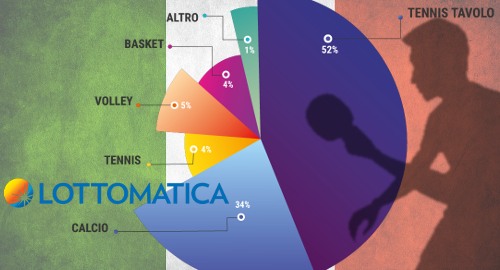 Italy’s online gamblers were preoccupied with ping-pong during their pandemic lockdown, according to a local operator.
Italy’s online gamblers were preoccupied with ping-pong during their pandemic lockdown, according to a local operator.
New data issued by Italian gaming operator Lottomatica’s so-called Lottomatica Betting Observatory showed that table tennis accounted for over half (52%) of wagers made on Lottomatica.it during the COVID-19 shutdown of Italian retail operations. Ping-pong, led by the Liga Pro and Setka Cup, claimed five of the lockdown’s top-10 betting markets.
Despite the shutdown of Serie A, the English Premier League, Bundesliga et al, football still claimed a 34% share of lockdown betting, thanks mainly to those asymptomatic all-stars in the Belarusian Premier League. Volleyball was well back in third place with 5%, narrowly beating out tennis and basketball (4% each), while all other sports combined for just a 1% slice of the pandemic pie.
In demographic terms, the lockdown punter was overwhelmingly male (90%) and neatly split between the 25-40 age demo (42%) and those aged 40-55 (41%). Sadly for anti-gambling types, the lockdown proved not to be a great spoiler of youth, as those in the 18-25 age group accounted for just 6% of pandemic wagering, around half the 11% claimed by those in the 55+ demo.
Meanwhile, Italy’s Ministry of Finance has offered a snapshot of the hit the gaming sector – as well as the government’s tax coffers – took from COVID-19. Over the first five months of 2020, sector-wide gaming revenue totaled €3.84b, a drop of 41.4% from the same period last year. Lotteries were off 41.7%, gaming machines plunged 46.4% and other gambling products slid 28.8%.
Despite Italy’s sports betting operators having been dealt a double-whammy via the closure of retail operations and the shutdown of most major league play, Italy’s government intends to claw back some of its lost tax revenue by forcing bookmakers to pay an additional 0.5% tax on betting turnover through the end of 2021.
Meanwhile, Italy’s beleaguered retail operators – who were already struggling long before the pandemic – have finally begun reopening their shops, albeit with limited capacity. But if Italy’s government keeps viewing the gambling sector as an all too convenient ATM, the next wave of retail closures will be permanent.